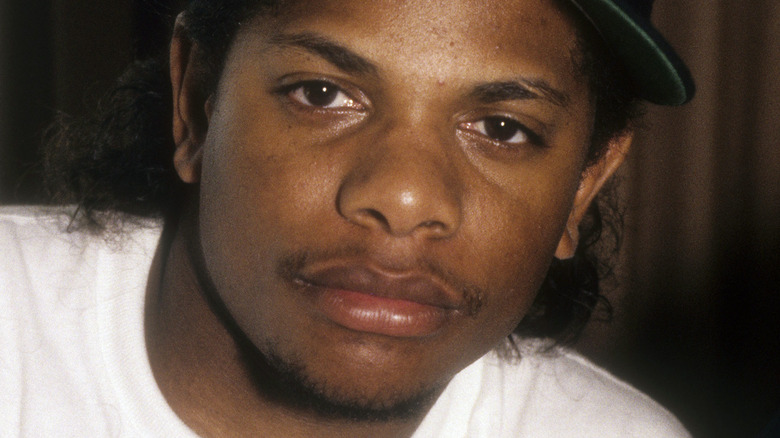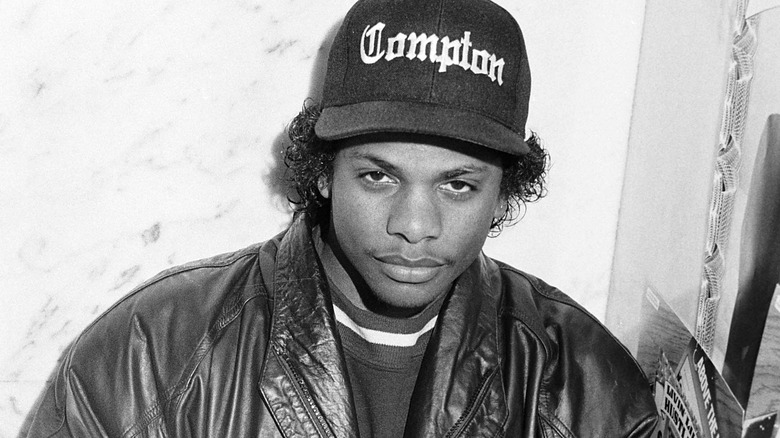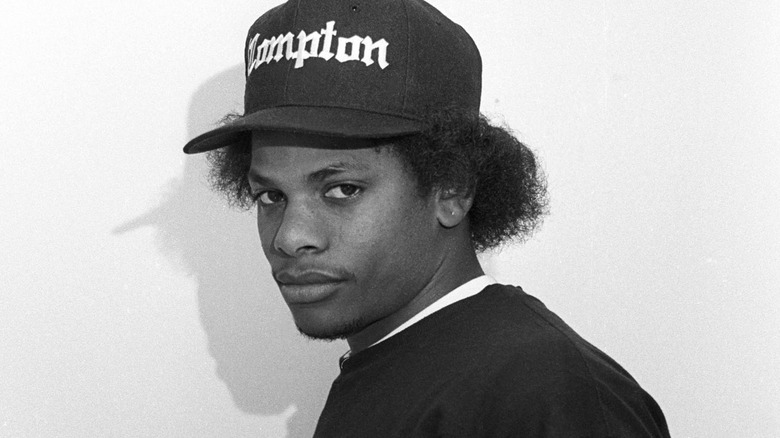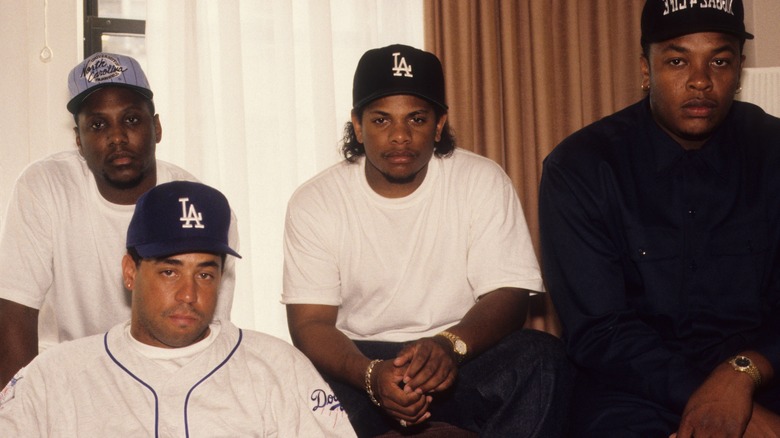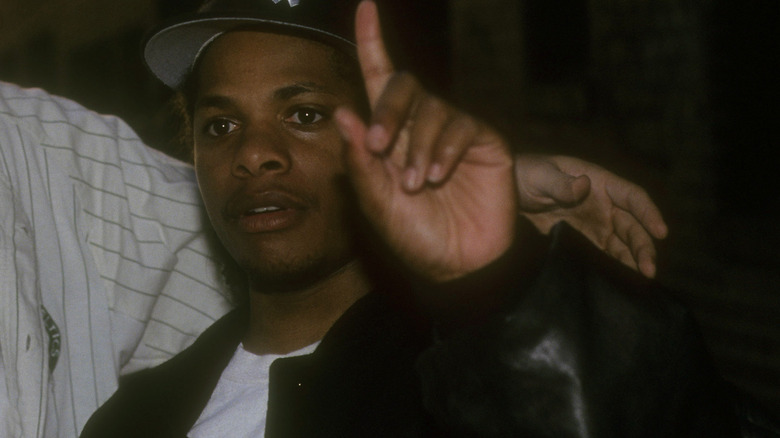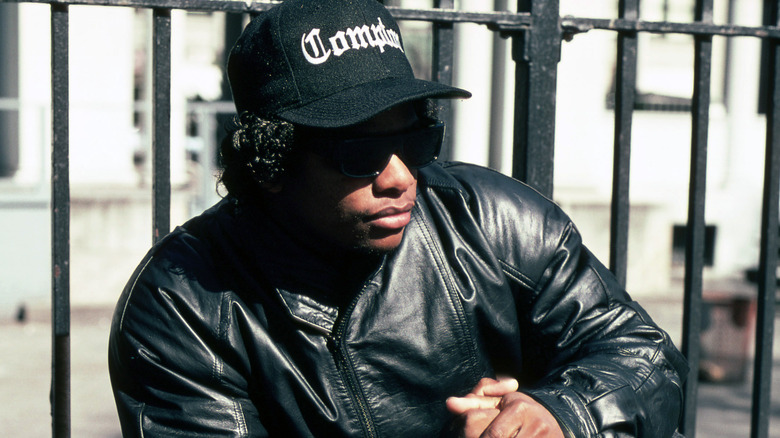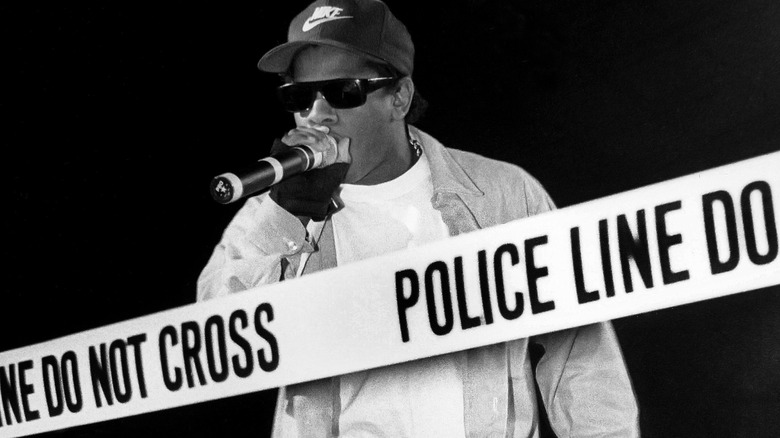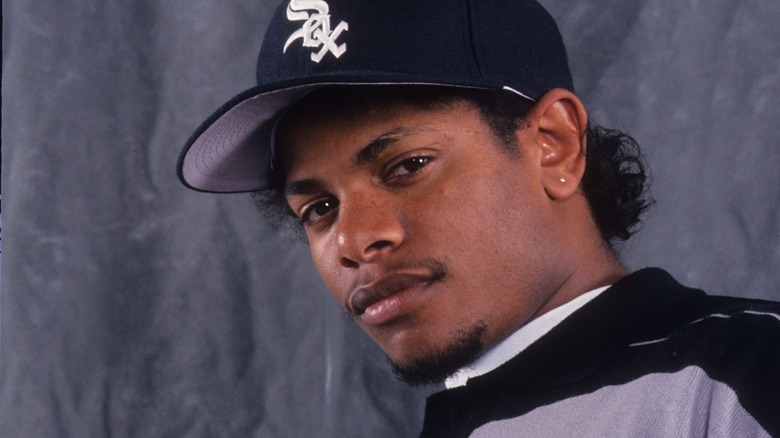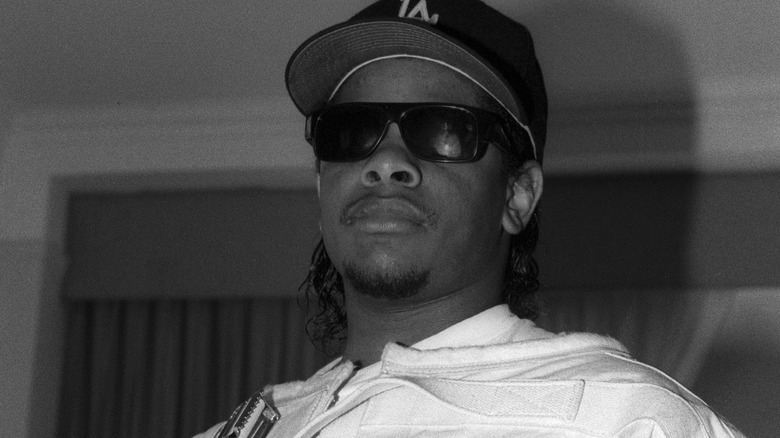The 8 Saddest Things About Eazy-E's Life
The following article contains references to drugs, murder, and racism
"This is an autobiography of the E." So rapped Eazy-E on the iconic title track of N.W.A.'s breakthrough 1988 record "Straight Outta Compton." With his smooth lyrical flow, and a tendency to flip the proverbial bird to authority, Eazy quickly became one of the most notorious and revered rappers of the era. A trailblazer, Eazy (real name Eric Lynn Wright) inspired an entire generation of hip-hop stars through his unique lyricism. "Eazy is and always will be the God of gangsta rap," fellow rapper The Game told XXL. "Any time someone mentions ... anything that goes against the grain in a rap song in this genre of hip-hop... That's Eazy-E. Know that."
While N.W.A.'s de facto leader may have spearheaded an entire movement soon to be labeled gangsta rap, his ascendancy to the highest echelons of the hip-hop game was not without its pitfalls. Internal strife within the band, personal trauma, business acrimony, and ultimately, a tragic end would blight Eazy's promising future. Like so many rap stars, Eazy left us far too soon. Had he survived, one can only ponder the musical and business future of the venerated musician and entrepreneur. Always an innovator, he may have followed in the footsteps of other rappers who sought to reinvent themselves, or, in the vein of his bandmate Dr. Dre, perhaps launched the careers of the future rap generation. Get the tissues ready as we take a look at the eight saddest things about Eazy-E's life.
Eazy-E dealt drugs as a child
Growing up in Compton amid gang warfare, life was tough for the young Eazy-E. Born in 1964, the decade would prove one of the most significant in Compton's history. Unscrupulous real estate agents began a practice known as blockbusting; essentially, they would propagate racist myths about Black people to white homeowners (Compton was predominantly white up until this period), who would quickly sell their homes at bargain prices. Those very homes would then be sold to Black people at extortionate prices. Indeed, one of the first Black families to move into the area was Eazy's. During this time, manufacturing jobs – on which most residents relied – became scarce, leading to high unemployment and poverty, as well as widespread racism.
As N.W.A. manager Jerry Heller explained in his book "Ruthless," the young Eazy did what he had to do to survive. "No one survived on the streets without a protective mask," Heller reflected. "No one survived naked. You had to have a role. You had to be 'thug,' 'playa,' 'athlete,' 'gangsta,' or 'dope man.' Otherwise, there was only one role left to you: 'victim.'" Accordingly, Eazy began dealing drugs, having dropped out of high school in the 10th grade. These experiences forced the budding young rapper to grow up before his time. "If you looked at Eazy's knuckles, they were gone," his friend, the musician Mazik, told Swindle. "They were dimpled. He had scars."
If you or anyone you know needs help with addiction issues, help is available. Visit the Substance Abuse and Mental Health Services Administration website or contact SAMHSA's National Helpline at 1-800-662-HELP (4357).
The rapper's cousin was murdered
As detailed in the book "Original Gangstas," Eazy-E learnt all about drug dealing through his cousin, Horace Butler, who showed him the ropes. One night, the pair were on a drug run and Butler handed Eazy a bag of cash, which he asked him to guard. Eazy agreed to do so and went about the rest of his day. Just hours later, Butler was riding with a different passenger, who shot him seven times and fled the scene. Eazy was devastated by his cousin's death. "Me and him used to be together every day," he reflected. "I just happened to go off and do some business with my mother that night, and I wasn't there. I figure I was there, I'd probably be dead right along with him."
Eazy began selling the drugs that his late cousin had left behind. Although he made a fortune, he soon found that his newfound profession was far from fulfilling. Moreover, the risk of ending up with a fate like his cousin loomed heavily. "There was always threats on Eric's life," his friend, Bigg A, divulged. Accordingly, Eazy used the money he had made through drug dealing to fund his first record. It was these harrowing experiences that shaped Eazy's professional output, which subsequently resonated with those who had been through similar tribulations. "Speaking the language that the streets spoke ... I think that's what people gravitated to the most," his childhood acquaintance, fellow rapper Dresta, told VladTV.
If you or anyone you know needs help with addiction issues, help is available. Visit the Substance Abuse and Mental Health Services Administration website or contact SAMHSA's National Helpline at 1-800-662-HELP (4357).
His band broke up due to internal conflict
Despite enjoying phenomenal success, N.W.A. was plagued by internal strife. Ice Cube left in 1989 due to financial disputes, as he revealed to Spin. The relationship between Ice Cube and Eazy-E had become incredibly strained by this point, and Eazy outright refused to discuss his former bandmate when Spin pressed him on the issue. N.W.A.'s manager, Jerry Heller, claimed that Ice Cube was jealous of Eazy. Speaking to Billboard, Ice Cube reflected on this particularly painful period. "It was other circumstances that tore us apart," he said. "It was more than each other ... It was just the fog of being new in the business... You can run into each other like helicopters crashing in the desert."
By 1992, Dr. Dre left and the band quickly dissolved thereafter. DJ Yella told Forbes that outside influences were responsible for the breakup, arguing that the band could have survived if they had performed a few more shows together. However, he blamed Heller for creating disharmony among the band members.
Appearing on the "Arsenio Hall Show," Eazy said that he had no plans to forgive his former bandmates. "If I got dissed and over a couple of million people heard about me trying to be hardcore, yeah, I don't think I want to make up," he said. Shortly before Eazy's death, however, he and Ice Cube ended their feud and even suggested reuniting to make music together again. Sadly, these plans would never materialize.
He was forced to sign over musical rights
A hip-hip pioneer, Eazy-E became the first rapper to own a hit record company when he founded Ruthless Records in 1986. "If it wasn't for Eazy-E, there probably wouldn't have been any Master Ps or Roc-A-Fellas," said rapper Layzie Bone to the Los Angeles Times. Unfortunately, Eazy soon fell into hardship over his label.
In 1992, he launched a lawsuit over various music execs, including Death Row Records founder, Suge Knight, who was well known as an imposing and violent figure in the industry. Eazy alleged that Knight and his cronies threatened him with baseball bats and forced him to sign over the rights of artists signed to Ruthless. He also alleged that Death Row Records was dealing in money laundering. Knight's camp denied the claims and Eazy's lawsuit was dismissed in 1993.
During an appearance on the "Murder Master Music Show," Jerry Heller discussed the feud between Death Row and Ruthless Records, lamenting the toll that Knight's actions bore upon Eazy. "I think, even more so now, that Suge Knight is an evil human being ... He was a bad guy and, you know, if he was a bad guy then, he's the worst guy now," he said. Heller revealed that Eazy once told him he wanted to kill Knight, but he managed to talk him out of it. Ultimately, Heller said, he wished that he had let Eazy kill his notorious rival.
His sad and complicated relationship with Jerry Heller
It didn't take long for Eazy-E and Jerry Heller to band together and form a strong bond — which would ultimately lead to N.W.A.'s dissolution. In an interview with Medium, Heller reflected on his relationship with Eazy, revealing that the pair shared a unique rapport. "That was our relationship," he said. "It was very much father–son."
However, their relationship was complicated by what many saw as dodgy deals. Heller has long been accused of cheating N.W.A. out of money rightfully owed to them. Notably, Ice Cube made very little money from his time in the band and was still living with his parents when he left in 1989. Although Heller denied that he had ever swindled the group, branding such claims absurd, the allegations were enough to end his once-loving bond with Eazy. Soon before the rapper died, he cut Heller out of his life, blaming him for destroying his relationships with Ice Cube and Dr. Dre.
In his book "Ruthless," Heller alleged that he was barred from visiting Eazy when he was dying in hospital and also claimed that his family wouldn't allow him to see his body when he lay in a funeral home. Nevertheless, Heller did attend the funeral, one of just two people associated with N.W.A. to do so (the other being DJ Yeller). "I still think about him every day," he told Rolling Stone. "He was like my son ... He was the greatest."
The KKK allegedly had a hit on Eazy-E
During his time in N.W.A., Eazy-E was targeted by the FBI due to the lyrical content of the group's most infamous song, "F*** Tha Police." Additionally, Jerry Heller revealed to Medium that police in Cincinnati charged the band with obscenity, something which he deemed to be a racist form of suppression and censorship. "Those places were unbelievably bigoted against the band," he said. "It was obvious what their motives were. In Cincinnati, the guys did 'F*** Tha Police' and the police came on stage and cited them for obscenity." Eazy not only ruffled feathers with the police, but he even attracted the ire of the far right.
Disturbingly, far right groups had plotted to assassinate Eazy. And in his final interview, conducted a couple of months before his death, Eazy revealed that the Ku Klux Klan and neo-Nazi skinheads took a hit out on both him and Rodney King. "They wanted to start a race war," he said. Speaking to VladTV, the rapper's friend, B.G. Knocc Out, said that he noticed something was awry with Eazy, but was skeptical of the KKK's alleged plot to kill him. "He used to ride around with a vest on ... I thought that was a result of the FBI thing because, you know, the FBI was trying to censor him ... It doesn't even make sense to me, like, what this little guy from the hood is doing to the KKK," he said.
Eazy-E was diagnosed with AIDS
In February 1995, Eazy-E's friends noticed that he was suffering from a persistent cough. Eazy, who assumed he had asthma, went to see a doctor and was shocked to learn that he had advanced AIDS. Almost immediately after, he was hospitalized in the ICU.
Shortly before he died, Eazy was interviewed by his publicist, Phyllis Pollack, and it's noted that he spent much of the time coughing. Speaking to Forbes, DJ Yella said that Eazy tried to keep his diagnosis a secret. "[Eazy] just didn't want me to know," he said. "I don't know if he was embarrassed or what ... He was talking normal all the way up until the day he had surgery. They put him in an induced coma after that." He noted that Eazy had lost a significant amount of weight, but attempted to hide his struggles from those around him.
Dr. Dre told BigBoyTV that Eazy was in high spirits when he last spoke to him. But just two weeks later, Eazy was receiving end of life care. Although Dre visited Eazy in hospital, he was unable to converse with him one last time as he was unconscious. "He didn't know I was in the room," he recalled. "He was on life support, you know, so I just reached down and whispered a few words in his ear." At the time of his diagnosis, Eazy's girlfriend, Tomica Woods, was pregnant. Accordingly, the couple got married when he was dying in hospital.
The tragic death of Eazy-E
On March 26th 1995, Eazy-E died, aged just 31. He suffered a collapsed lung due to AIDS complications. He was survived by his parents, who were both by his bedside. Six months later, his wife gave birth to their daughter.
Reflecting on having to say goodbye to his friend, DJ Yella told Forbes that he almost abandoned music altogether. "I remember when they buried him and they put the dirt on top of him and then everybody left, I said, 'I'm done with music,'" he revealed.
Since Eazy's passing, many questions have been raised about the fact that he succumbed to AIDS so quickly. Subsequently, members of his family have suggested that he was murdered. In 2003, Suge Knight made a now-infamous appearance on "Jimmy Kimme Live" in which he claimed that someone could be given AIDS by being shot with infected blood. "Eazy-E thing, know what I mean?" he quipped. Eazy's son believes that his father was murdered in such a way. Meanwhile, his daughter, Ebie, has said that she doesn't believe he died of AIDS. "I have never believed that my father died of full-blown AIDS," Ebie argued in the documentary "The Mysterious Death of Easy-Z." "I have always believed that something else happened and I'm afraid of what that might be." DJ Yella told VladTV that while Eazy was indeed diagnosed with AIDS, he didn't rule out the possibility that he was purposely infected.

